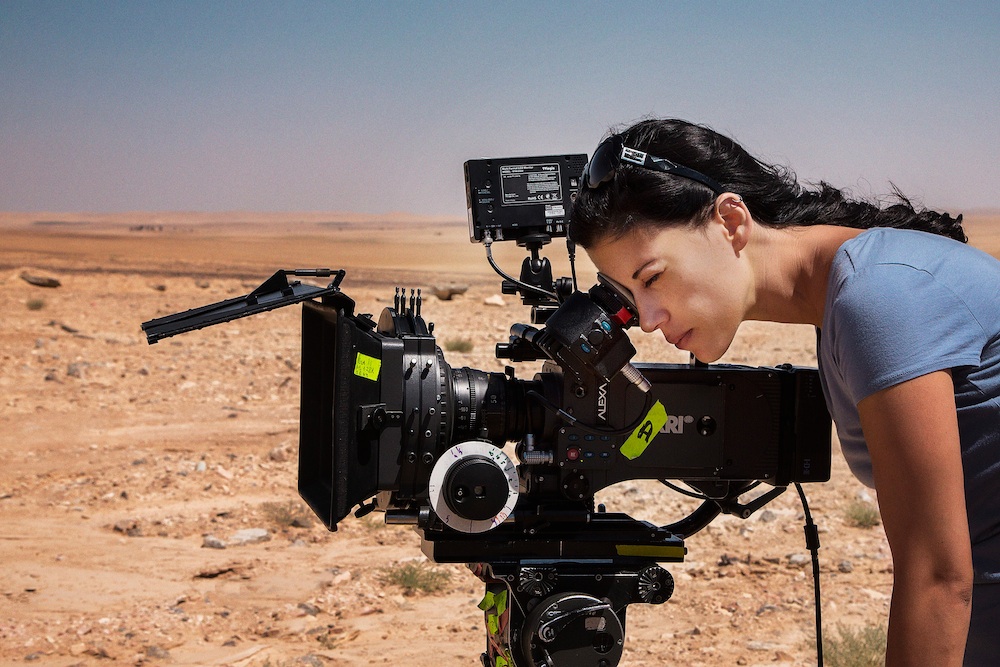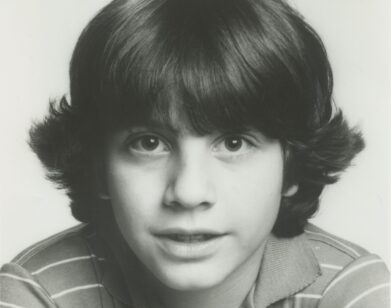Cherien Dabis: Writer, Director, Accidental Actress

ABOVE: CHERIEN DABIS ON THE SET OF MAY IN THE SUMMER
As a child traveling back and forth between the United States and her ancestral home of Jordan, Cherien Dabis envisioned herself as an actress. When it came to for graduate school, however, Dabis decided to study writing and directing at Columbia. With her latest film, May in the Summer, Dabis finally steps out from behind the camera to play the titular character May Brennan, a Jordanian-American writer engaged to marry a Palestinian man. May returns to Jordan to plan her wedding with her family—her mother Nadine (Hiam Abbass), who disapproves of her daughter marrying outside the family’s religion, and sisters Yasmine and Dalia (Nadine Malouf and Alia Shawkat)—all of whom are confronting her own romantic challenges.
“I just couldn’t find somebody who fully embodied the spirit of the character and also had the traits that I needed—the linguistic skill,” she explains of her decision to play the role herself. “People started suggesting that I do it, and I looked at them like they were crazy.” But when she finally put herself through the casting process—audition, callbacks, screen tests—and approached the suggestion from an objective angle, she realized she was best-suited to a part she had written for someone else. The only thing holding her back, she says, was fear. But after a year and a half of coaching with Hollywood veteran Hal Lehrman, rehearsing simultaneously acting and directing scenes from the film, Dabis’s uncertainty was quieted.
For May in the Summer, Dabis acted as writer, director, lead actress and producer. She even curated much of the evocative soundtrack. “They’re all parts of the same process, and I love the process,” she says. Dabis’s storytelling process is rooted in her own experience as what she described multiple times as the “hyphenated Arab-American” experience. Her previous film, Amreeka, which, like May in the Summer, also premiered at Sundance, portrayed an immigrant Palestinian family in suburban Chicago. May in the Summer offers the reverse side of that tale—the American who finds herself in the Middle East. While the characters and situations in each film are distinct, between the shared actresses (Abbass and Shawkat both appeared in Amreeka) and the similar plot devices, it’s impossible not to see them as a sort of diptych, a rounded image of the Arab-American immigrant identity. And Dabis says she intended it this way—”Amreeka really speaks to one half of my cultural identity, which is the Arab in America, and now the other half is the American in the Arab world.”
Now, having wrapped up this duo of films inspired by and exploring her own identity, Dabis is working on two television shows (she spent several seasons as a writer for The L Word) and her latest feature, a Palestinian film, has been accepted to the Venice Film Festival and Toronto International Film Festival. As for the future of her acting? “I’m open! We’ll see.”
KATHERINE CUSUMANO: May emulates a lot of your biographical traits. She’s torn between her Jordanian and American identities, and she’s on the cusp of marrying a Palestinian—those are all parts of your life, too. How much of her character was intentionally based on your own experiences?
CHERIEN DABIS: I was really inspired by my own experience, and specifically my own identity crisis, in a way. My own cultural identity. But larger than that, I also wanted to explore the trend of reverse immigration, of the immigrant returning home after being in a host country or an adopted home for 20 years, and finding themselves at various levels of discord with the home culture. I wanted to explore people building lives across multiple geographies. I think that’s, something that we’re experiencing more and more as travel becomes easier, as people are traveling more for work. People can work from anywhere.
CUSUMANO: What were some of the challenges of playing yourself but also as a character?
DABIS: Well, I definitely did not play myself. [laughs] I am not May. I’m a mix of all the characters—especially the three sisters. I mean, maybe different. I was the party, younger sister when I was younger. Especially as the writer of the script, I have traits of all the characters. I can relate to all of the characters, and I didn’t write the role of May for myself.
CUSUMANO: How does the film evolve over the course of production? You came up with it, and you were the one who was directing it and guiding it through the filming process but also the one who was on camera making it really move.
DABIS: It’s a really challenging position to put yourself in, and I think that you have to have a really specific type of personality to be able to both direct and act, because it requires enormous shifts in perspective. I mean, when you’re directing, you’re looking at the world through a wide-angle lens, and you’re seeing all of it. You know exactly what’s happening in every corner of it. You know what people are going to say. You know what they’re going to do. You’re controlling everything. When you step in to act, you just zoom way in on the longest possible lens and you’re just totally in the point of view of your character and you have to forget about everyone else. You don’t care about what anybody else is, what they want or what they’re trying to do. You’re just concerned with your circumstances, what you’re trying to get out of someone or some scene. I have to try to watch myself and give myself feedback. People would take for granted that I was ready to go right away. And I would say, “No, no, no, no, I actually have to go talk to myself.” Because I need to just take a minute to think about what just happened and tell myself what to do in the next take, so just give me two minutes to go be a director. When there’s an actor involved, the actor’s talking to the director or the director’s talking to the actor. But when there are not those two people interacting, it’s all one person in your own mind, you have to be so extra-clear about what you need. That was tough.
CUSUMANO: One of the things that stood out to me the most was how fluidly it goes back and forth between English and Arabic. Did you grow up with both languages?
DABIS: I did, yeah. It was definitely Arabic at home. We spoke Arabic at home.
CUSUMANO: And also, interspersed in the scenes of action were those frames—Arabic proverbs with translations. That was a nod to May’s book but also reminded me of silent film title cards. What inspired you to incorporate those moments?
DABIS: Those were a part of the script from literally the beginning. I think they were one of the first things that I wanted to do. I wanted to parallel, or connect, May’s inner restlessness with the fragmentation of the family, but also the political fragmentation because I’m always looking for ways to explore the politics of the everyday. For me, the proverbs were a way of bringing in this ancient wisdom that in Arabic culture is often quoted. Those proverbs are such a huge part of the language and parts of people’s every day. This is the wisdom that we use in our everyday life but we’re not always listening to.
CUSUMANO: How did your experiences spending time in Jordan impact the way that you wrote the country into your screenplay?
DABIS: Well, I grew up going there, so in a way, I discovered myself in the back-and-forth and in the hyphenated Arab-American way, and one of the things that I discovered was that I really didn’t fit in anywhere. So in the US, I was considered an Arab— because I grew up in small-town Ohio—and in the Middle East, I was considered the American. There was something about that juxtaposition that always haunted me and always made me want to explore what that was and what that meant. Jordan is many different things and there’s many different parts of it. We don’t ever really get to see a modern Arab city, a part of the Arab world where people are seemingly living their lives like everywhere else and also just a part of the Arab world that’s surprisingly Americanized, with fast-food joints everywhere and shopping malls. Over the 30 years I’ve been traveling there, I really saw it grow and become modernized and much more Americanized in a way that surprised me as an Arab-American. As a kid, you couldn’t find American brands in the supermarket anywhere. I remember the first time Safeway opened up, but it was so expensive, we couldn’t afford to get the imported products. And that was such a big deal. Then came the fast-food joints, and then came the Starbucks.
CUSUMANO: Was there an American thing that you missed the most when you traveled there, since it was not super accessible?
DABIS: I remember one summer I had such a craving for bananas. I could not find bananas anywhere in the country, and I just so badly needed bananas. My mother drove all over the city looking for bananas, and finally we found these teeny-tiny little mini bananas. Then you come to the US and you look for things. You miss the cucumbers. In the Middle East, you get these little cucumbers, and actually now they import them. They call them Persian cucumbers—the little cucumbers that are really crunchy. They’re so good. But those are everywhere in the Middle East. And figs. You come back to the US and you just miss the figs. They’re not the same.
CUSUMANO: I wanted to talk about the people you worked with on the film, because the stars come from a pretty diverse array of backgrounds. You have Alia Shawkat—she’s probably best known for Arrested Development. And Hiam Abbass is very well-respected and pretty high-profile in Jordan. How did you assemble this cast from such an array of backgrounds?
DABIS: Well Hiam’s actually Palestinian-French. She’s pretty international, and she’s well-known in the Arab world but also in France, and she’s done a number of American films as well. I don’t know if you ever saw the The Visitor, which is actually quite good, and she did Miral as well. The name of the director is Julian Schnabel. So she’s someone who I’d heard about, knew about, especially as someone who watched a lot of Middle Eastern cinema. I’d seen her in Lemon Tree, The Syrian Bride—they’re the Israeli-Palestinian films. When I cast Amreeka, I had to do so much homework because it was my first film and I didn’t really know the Middle Eastern acting community at the time. When it came around to this movie, it was a bit easier. I felt like I knew who people were a little more, and I’d worked with Hiam and Alia and I just loved working with them, and when I started writing May in the Summer I just immediately thought of them. With regard to the other characters, I was picturing some of them as I was writing, again just because I had immersed myself in the community and knew, but Nadine Malouf, who I discovered in New York, I didn’t know her. She was sort of a discovery. She plays the third sister. Ritu Singh Pande is actually an executive producer on the film, so that sort of happened through the business connection, and then Bill Pullman—I always wanted their father to be American, which is not my experience at all, actually. My father’s Palestinian. But I wanted it to be really Arab-American.
CUSUMANO: What kind of films did you grow up with?
DABIS: I grew up watching a lot of Egyptian movies. My parents had this huge VHS collection of every Egyptian movie you can possibly imagine, and Egypt was kind of the Hollwood of the Middle East back in the ’40s, ’50s, and ’60s. That was my first education in film. And then on the American side, some of the movies that I watched when I was a kid, like E.T. or The Wizard of Oz, those are films that changed my point of view of what film could be, of what you could do. Those are the ones that I remember were incredible when I was younger.
CUSUMANO: What kind of movies do you watch now?
DABIS: Now, I watch everything from independent art-house cinema to foreign film. I don’t watch as many Hollywood blockbusters but once in a while, I’m curious. I like to see what’s out there. Some of my favorite all-time movies—Wong Kar-wai is just amazing. In the Mood for Love is probably my favorite film ever. Those lyrical montages are so stunning.
CUSUMANO: Did you always want to go into film?
DABIS: From as early as I can remember, I wanted to have something to do with the acting business. I was a TV junkie as a kid and I think, because I grew up in a small town where I couldn’t imagine myself staying there and couldn’t see myself being any of the people that I was surrounded by in this town, I just knew that I wanted a different kind of a life, but I didn’t know what that meant and I didn’t know how. I knew that I wanted to live in a city, but had never really been to New York. But I was begging my parents as a kid to move to New York, so it was just something that I sort of knew from a young age.
CUSUMANO: Why do you think that—and fiction in film in particular—is an important medium for exploring identity?
DABIS: [pauses] I think that film is just a really powerful medium for exploring so many issues. It’s very personal. It’s very emotional. It’s why I fell in love with movies. You can sit in a movie theater and be transported to a place that you never get to go and be a person who you never in your life would get to be and feel something and have empathy for people and see things from another point of view. When it comes to identity, that was an issue that plagued me for a lot of my life. It’s something that I wanted to tap into, but I would like to explore many other things in film, as well. It can really take you to other places, and sometimes that’s necessary to understand your own identity or someone else’s identity or just the issue of identity, in general. It takes you. It’s borderless. It’s boundless. It’s universal. [pauses] I think it travels well. [laughs]
MAY IN THE SUMMER OPENS IN LIMITED RELEASE THIS FRIDAY, AUGUST 22.






